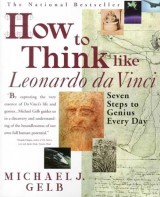Steven R. Southard's Blog, page 60
September 27, 2015
Arte/Scienza
Here is the fifth post in my series. I’ve been discussing how the seven principles put forth by Michael J. Gelb in his book How to Think Like Leonardo da Vinci relate to fiction writing. Today’s principle is Arte/Scienza, or “Development of the balance between science and art, logic and imagination, ‘whole-brain’ thinking.”
 In the book, Gelb demonstrates how Leonardo embodied the kind of balanced thinking intended by the term Arte/Scienza. His artistic paintings contain precise mathematical s...
In the book, Gelb demonstrates how Leonardo embodied the kind of balanced thinking intended by the term Arte/Scienza. His artistic paintings contain precise mathematical s...
September 20, 2015
Sfumato
Next in this series of blog posts is a strange one: Sfumato. I’m blogging about how each of the seven principles in How to Think Like Leonardo da Vinci, by Michael J. Gelb, relates to fiction writing. Today I grapple with the fourth principle, Sfumato, a word that means “going up in smoke.”
Gelb’s definition of Sfumato is “a willingness to embrace ambiguity, paradox, and uncertainty.” Although most people prefer knowledge, predictability, and clarity, Gelb contends that Leonardo did not shy a...
September 13, 2015
Sensazione
We’ve come to the third principle in Michael J. Gelb’s remarkable book, How to Think Like Leonardo da Vinci. In recent blog posts, I’ve been relating each principle to fiction writers, encouraging you to think like Leonardo as you write.
 The third principle is Sensazione, which Gelb defines as “the continual refinement of the senses, especially sight, as the means to enliven experience.” Leonardo knew that we experience life through our five senses; therefore, only the person who could enhanc...
The third principle is Sensazione, which Gelb defines as “the continual refinement of the senses, especially sight, as the means to enliven experience.” Leonardo knew that we experience life through our five senses; therefore, only the person who could enhanc...
September 6, 2015
Book Giveaway Contest
I’m running my first book giveaway! I’ll be giving away three free copies of “The Wind-Sphere Ship,” which normally sells for $2.99.
Giveaway ends September 24, at 11:59 PM EST. There will be three winners, each receiving an eBook copy of The Wind-Sphere Ship, by Steven R. Southard. The giveaway is open to anyone with an e-mail address. Digital copies will be distributed via Smashwords.com where the preferred format can be chosen. Winners will be selected randomly via Raff...
Dimonstrazione
We’re continuing today with my series of blog posts discussing the principles of How to Think like Leonardo da Vinci, by Michael J. Gelb, and how they relate to writing fiction. Today’s principle is Dimonstrazione, a commitment to test knowledge through experience, persistence, and a willingness to learn from mistakes.
 It’s not enough just to be curious about people and the world, as the first principle of Curiosità advocated. You must add to your knowledge and seek truth by testing and exper...
It’s not enough just to be curious about people and the world, as the first principle of Curiosità advocated. You must add to your knowledge and seek truth by testing and exper...
August 30, 2015
Curiosità
Some time ago, I promised to write seven separate blog posts, one for each of the principles espoused in How to Think like Leonardo da Vinci, by Michael J. Gelb. I said I’d relate them to writing fiction. This is the first post in that series.
 The first principle is Curiosità, which Gelb defines as “an insatiably curious approach to life and an unrelenting quest for continuous learning.” He discusses Leonardo’s curiosity and provides worthwhile exercises for developing your own inquisitivenes...
The first principle is Curiosità, which Gelb defines as “an insatiably curious approach to life and an unrelenting quest for continuous learning.” He discusses Leonardo’s curiosity and provides worthwhile exercises for developing your own inquisitivenes...
August 23, 2015
Writing Blurbs
Whether readers buy books online or in a bookstore, they look at the cover first and the blurb second. If the blurb doesn’t grab them, they move on. Don’t kill that sale with a bad blurb.
 A blurb is defined as a short description of your book, written for promotional purposes and appearing on the back cover. That definition sucks all the life out of the word, though. Scratch out “written for promotional purposes” and substitute “written to seize the prospective reader’s attention and imbed an...
A blurb is defined as a short description of your book, written for promotional purposes and appearing on the back cover. That definition sucks all the life out of the word, though. Scratch out “written for promotional purposes” and substitute “written to seize the prospective reader’s attention and imbed an...
August 9, 2015
Dumped in the Middle of the Road
You’re reading along down the story highway, racing through action scenes, taking the dialogue curves at a good clip, the wind of the story’s world in your hair. All of a sudden, a truck up ahead upends its load and a pile of text pours onto the pavement, right in your path.
You’ve been stalled by an infodump.
You come to a stop to decide what to do. You could plow right through it at slow speed, but you hate that. You could drive around, avoiding it entirely, but some of that text might be...
August 2, 2015
Read Your Story Aloud — 10 Reasons Why
It’s vital to read your story aloud before submitting the manuscript for publication. You may consider that a waste of time, since you can  read the story silently to yourself more easily, and because silent reading is the way most readers will experience your work as well.
read the story silently to yourself more easily, and because silent reading is the way most readers will experience your work as well.
I contend you really should take the time for reading aloud, and for making that technique one of your final editing methods. For several of the reasons below, I’m indebted to Joanna Penn.
After reading your story silently...July 26, 2015
Before You Write that Scene
What are the things you should be thinking about before you write a scene in your story? Pantzers and Plotters will approach this question differently in the first draft, but in subsequent drafts, the questions will be the same.
Whether your work is a novel or short story, it is a sequence of scenes. A novel’s chapter can have one or more scenes, as can a ‘part’ or ‘section’ of a short story.
I’ll look at two approaches today, and you can combine them or pick the one you like. When I research...





